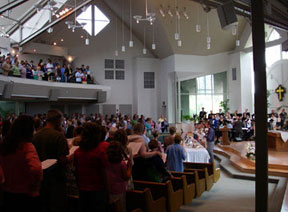« Denominations, Toothpaste, and Toilet Paper: Just the Facts, Ma’am | Home | Why Are Protestants More Loyal to Their Toothpaste Than to Their Denomination? Section 2 »
Why Are Protestants More Loyal to Their Toothpaste Than to Their Denomination?
By Mark D. Roberts | Thursday, February 19, 2009
Part 2 of series: Denominations, Toothpaste, and Toilet Paper
Permalink for this post / Permalink for this series
In yesterday’s post I summarized the results of an Ellison Research that found American Protestants to be more loyal to their brand of toothpaste than to their brand of church (i.e. denomination). Although I have neither the technical details nor the expertise to evaluate the accuracy of these findings, they make sense to me intuitively and experientially.
For sixteen years I was the Senior Pastor of Irvine Presbyterian Church (PCUSA). During that time we received something like a thousand new members. I met most of these in our new members’ class, and heard something of their religious background. I’d guess that, at most, a third of those joining our church had been Presbyterians before. The solid majority came from a wide range of religious traditions, including: Baptist, Roman Catholic, Episcopalian, Methodist, Vineyard, and non-denominational. Some of our new members had been raised as Jews, Muslims, or atheist/agnostics. Even those who had been Presbyterian did not chose our church primarily because it was the only Presbyterian church in town. Their Presbyterian background got them to visit, but they were joining because they affirmed our vision, connected with our people, and felt drawn to God through our worship and other ministries.
So it doesn’t surprise me that only 16% of Protestants are so loyal to their denomination that, if they moved, they would only consider a new church within their denomination. Nevertheless, it’s worth wondering why this is so. I can think of many reasons, several of which were anticipated by yesterday’s commenters.
The language of the Ellison Research study used the language of branding. People are more loyal to their brand of toothpaste than their brand of church, that is, their denomination. This conclusion suggests a fundamental question:
What is my brand of church?
Many people, including the Ellison Research folk, would say that my brand is Presbyterian. That is true, in a way. But it is also profoundly untrue, in another way. Let me explain.
Yes, I’ve been a Presbyterian for most of my life, though I was baptized a Methodist and attended Assembly of God, Catholic, and Mennonite churches while in college and grad school. Nevertheless, as an ordained minister of Word and Sacrament in the Presbyterian Church (USA), I’m about as Presbyterian as one can get. I have served in Presbyterian churches for the last 25 years and continue to be active in a Presbyterian church even though I’m no longer on the staff.
Yet I don’t think of myself primarily as a Presbyterian, but as a Christian. I am first and foremost a disciple of Jesus Christ. My basic brand, as I think of it, is Christian, not Presbyterian. In my current position as Senior Director of Laity Lodge, I am regularly interacting with Methodists, Episcopalians, Baptists, and others. I join them in worship either in their churches or at Laity Lodge. Inevitably, what I experience in these settings is the sense of just how much we have in common as Christians. What we have in common is much more pronounced that where we differ. Sure, the Episcopalians use wine in the Eucharist, while the Presbyterians use grape juice in the Lord’s Supper, but we are united in remembering Christ’s death for us and in our reliance on his grace.
When I was senior pastor of Irvine Presbyterian Church, I made no effort to build brand loyalty to Presbyterianism. I wanted my church members to be loyal first and foremost to Jesus Christ. I rarely talked about the Presbyterian Church and its benefits. Instead, I talked endlessly about Christ and his benefits.
Moreover, when people moved away from our area and sought my advice about churches where they lived, I never limited my recommendations to Presbyterian churches. Yes, I did always try to find some strong Presbyterian churches in their region. But it was not my goal as their pastor to make sure they remained Presbyterian. Rather, I wanted them to be in healthy, Christ-centered, Bible-based, gospel-driven churches, no matter the denomination. I’ll admit that I was usually just a bit happier when folks who moved away joined a strong Presbyterian church. But my main concern was for the quality of church, not its denominational label.
 I remember one time, in particular, when friends from Irvine moved to a suburb of Chicago. Jim and Sherry were died-in-the-wool Presbyterians who had been valuable leaders at Irvine Presbyterian Church. There was, in fact, a Presbyterian church in their new town. But it was relatively lifeless. Moreover, it’s youth ministry was pathetic, and my friends had three teenagers. Jim and Sherry tried other Presbyterian churches nearby, but found more or less the same situation. (Photo: Worship at Irvine Presbyterian Church)
I remember one time, in particular, when friends from Irvine moved to a suburb of Chicago. Jim and Sherry were died-in-the-wool Presbyterians who had been valuable leaders at Irvine Presbyterian Church. There was, in fact, a Presbyterian church in their new town. But it was relatively lifeless. Moreover, it’s youth ministry was pathetic, and my friends had three teenagers. Jim and Sherry tried other Presbyterian churches nearby, but found more or less the same situation. (Photo: Worship at Irvine Presbyterian Church)
 Almost in desperation, they decided to visit Willow Creek Community Church, a “seeker-sensitive” megachurch not to far from their home. The Sunday morning worship service hardly felt like church to them, though they had positive things to say about the quality of the sermon. But their children loved the youth groups. These weren’t just about entertaining program, but rather were committed to helping young people become Christians and grow in their Christian faith. After several visits to Willow Creek, Jim and Sherry felt terribly confused. Should they leave the Presbyterian denomination? How could they abandon their denomination for a non-denominational megachurch. (Photo: Worship at Willow Creek Community Church.)
Almost in desperation, they decided to visit Willow Creek Community Church, a “seeker-sensitive” megachurch not to far from their home. The Sunday morning worship service hardly felt like church to them, though they had positive things to say about the quality of the sermon. But their children loved the youth groups. These weren’t just about entertaining program, but rather were committed to helping young people become Christians and grow in their Christian faith. After several visits to Willow Creek, Jim and Sherry felt terribly confused. Should they leave the Presbyterian denomination? How could they abandon their denomination for a non-denominational megachurch. (Photo: Worship at Willow Creek Community Church.)
When Jim and Sherry called me for advice, I listen to their experiences and concerns. After they were finished, I asked one question: “Where do you think your children will be helped in their growth as disciples of Jesus?” Their answer was unequivocal: “At Willow Creek.” My response was equally unequivocal: “Then that’s where you should go.” Did I wish they had found a good Presbyterian church? I expect so. But as long as Jim, Sherry, and their children were going to a Christian church, and an excellent one at that, then I wasn’t concerned that they were switching brands. At the deepest level, and the one that matters most, they were staying with the “Christian brand.”
In my conversation with Jim and Sherry, I also realized that, in some ways, I sensed more “brand loyalty” to Willow Creek than to certain churches in my own denomination. I’ll say more about this in my next post.
At any rate, I would answer the question: Why are Protestants more loyal to their toothpaste than to their denomination? by saying this: For many Protestants, the brand of “Christian” means far more than any denominational label. They are, first and foremost, Christians, and not Presbyterians or Methodists or Baptists.
Topics: Denominations & Toothpaste |
5 Responses to “Why Are Protestants More Loyal to Their Toothpaste Than to Their Denomination?”
Comments
Thanks for your willingness to make a comment. Note: I do not moderate comments before they are posted, though they are automatically screened for profanities, spam, etc., and sometimes the screening program holds comments for moderation even though they're not offensive. I encourage open dialogue and serious disagreement, and am always willing to learn from my mistakes. I will not delete comments unless they are extraordinarily rude or irrelevant to the topic at hand. You do need to login in order to make a comment, because this cuts down on spam. You are free to use a nickname if you wish. Finally, I will eventually read all comments, but I don't have the time to respond to them on a consistent basis because I've got a few other demands on my time, like my "day job," my family, sleep, etc.
You must be logged in to post a comment.















February 19th, 2009 at 2:04 am
One of my favorite quotes -
“I am first a Christian, next a catholic, then a Calvinist, fourth a paedobaptist, and fifth a Presbyterian. I cannot reverse this order.
John ‘Rabbi’ Duncan - Scottish minister and theologian “Free Church of Scotland”
February 19th, 2009 at 3:46 am
“Yet I don’t think of myself primarily as a Presbyterian, but as a Christian. I am first and foremost a disciple of Jesus Christ.”
Ha! I knew it! That’s a big part of the reason I’ve been reading your blog for going on five years now.
Christ first, the rest after. I think that’s one reason why our church of 1600 in a town of 20,000 keeps growing - a staff that consistently preaches Christ and Him crucified, rather that devoting large parts of sermons to Luther and loyalty to him.
Tom
February 19th, 2009 at 12:45 pm
Mark,
Your post reflects my beliefs as well.
I was raised in a little, country Presbyterian Church my ancestors helped establish 185 years ago—ancestors who came over from the “Mother” church of Scotland! Yet I have had a wide range of experiences with other churches through friends and youth groups and seminary (Fuller) that has helped me gain a perspective beyond “party loyalty”. While I am called by God to labor in the Presbyterian Church, my labor and “brand loyalty” is to God.
God’s blessings to you,
Matt Ferguson
Hillsboro, IL
February 19th, 2009 at 2:37 pm
Rev. Mark Roberts & Family, Thanks for your latest 3 posts. After a relatively serious health emergency in the family, your posts offered insight, wisdom & comfort. Recently, via the web I was researching churches in Hawaii. Thanks again for posting all the photos & encouraging words. God Bless & God speed Falconer family
February 19th, 2009 at 4:12 pm
“When I was senior pastor of Irvine Presbyterian Church, I made no effort to build brand loyalty to Presbyterianism. I wanted my church members to be loyal first and foremost to Jesus Christ. I rarely talked about the Presbyterian Church and its benefits. Instead, I talked endlessly about Christ and his benefits.”
Mark,
I can’t tell you how cathartic it was to read those words! This named something I’ve felt for a long time. I’m a PCUSA pastor, too, and I am deeply concerned with the rampant institutional idolatry that passes for evangelism or preaching in our denomination. Thank you.
Ray McCalla